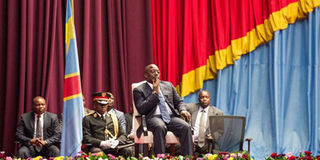Kabila ignores calls to step down

Congolese President Joseph Kabila (centre) stands during a special joint session of parliament the day after Prime Minister Augustin Matata resigned to make way for an opposition figure in line with a controversial deal that effectively extends the president's term in office, on November 15, 2016 in Kinshasa. PHOTO | JUNIOR D.KANNAH | AFP
What you need to know:
- President Joseph Kabila defiant speech to parliament comes as criticism grows following a controversial deal between the government and fringe opposition groups that effectively extends the president’s term in office and delays elections until late 2017.
- The deal followed a “national dialogue” that was aimed at calming soaring political tensions but was largely boycotted by leading opposition figures.
- Mr Augustin Matata resigned as prime minister Monday to make way for an opposition figure to take his place.
KINSHASA
Congolese President Joseph Kabila on Wednesday defied calls to step down when his term ends next month and vowed during remarks to lawmakers to defend his government against violent overthrow.
His defiant speech to parliament came as criticism grows following a controversial deal between the government and fringe opposition groups that effectively extends the president’s term in office and delays elections until late 2017.
The deal agreed last month followed a “national dialogue” that was aimed at calming soaring political tensions but was largely boycotted by leading opposition figures.
“The deal currently represents the only roadmap put in place by the Congolese themselves,” said Kabila during the speech to parliamentarians in the capital Kinshasa.
As part of the deal, Mr Augustin Matata resigned as prime minister Monday to make way for an opposition figure to take his place.
The main dissident coalition “Rassemblement” (Gathering) — which has rallied around veteran opposition leader Etienne Tshisekedi — has rejected the deal and stepped up its calls for Kabila to leave office by December 19 when his term ends.
“The disinterest shown by some parties... is totally unacceptable,” said Mr Kabila.
“The DRC cannot be taken hostage by the fringe of the political class,” he said as he called on the “Rassemblement” bloc to “come and sign the deal”.
He added that he was ready to defend against any attempt to take over the country by force, pledging that elections would be organised in the coming months.
JOURNALIST SHOT DEAD
Meanwhile, a Congolese journalist working for state media was shot dead on Monday night at his home in the centre of the country, Congo’s National Press Union (UNPC) said Wednesday.
“We condemn the death of Marcel Lubala of RTNC (Congolese National Radio and Television) who was struck down on Monday night as he slept peacefully with his family,” said UNPC president Joseph Boucard Kasonga Tshilunde.
Lubala was the 16th journalist in 10 years to be slain in Democratic Republic of Congo, the UNPC president said.
Tshilunde also said he was “deeply troubled” by the fact that the murder took place when “only the police carries out night patrols in the city of Mbuji-Mayi”, capital of Eastern Kasai province.
An overnight curfew was slapped on Mbuji-Mayi late September following fierce clashes between police and supporters of a local chief killed the previous month in the neighbouring province of Central Kasai. Around 100 people died in the clashes.
A source close to the Eastern Kasai governor said a series of robberies had taken place during the curfew and that police could be behind the journalist’s death.
Early this month a local media rights group, Journalists In Danger (JED), noted in its annual report that targeted attacks against Congolese journalists were on the increase.




